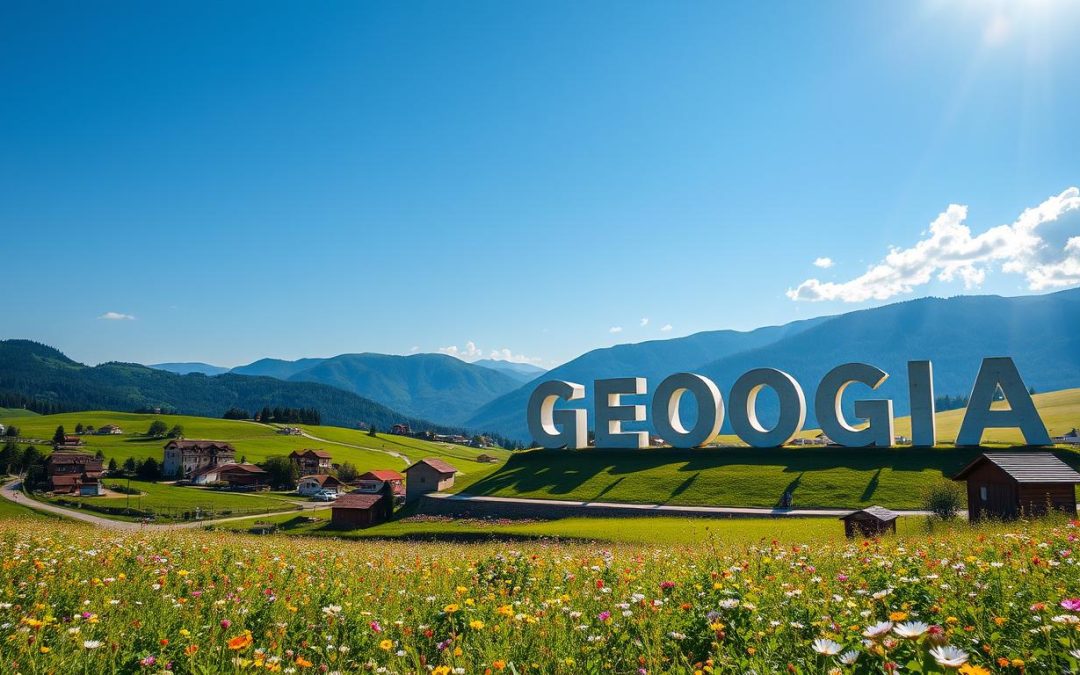Ever thought about how a small country in the Caucasus keeps its language alive? Georgia (Europe) is a great example of preserving language and culture.
The Georgian language is at the heart of the nation. It’s the official language and is spoken by 88% of people. With about 3.76 million native speakers, it’s more than just a way to talk—it’s a symbol of Georgia’s deep culture.
Exploring Georgia’s language scene shows a language that has lasted through many historical ups and downs. It has kept its unique identity through all kinds of changes. The Georgian language is not just for talking; it’s a sign of national pride.
Key Takeaways
- Georgian is the official language of Georgia, spoken by 88% of the population
- Approximately 3.76 million people speak Georgian as their native language
- The language has a unique script and belongs to the Kartvelian language family
- Georgian has survived numerous historical challenges, maintaining its cultural significance
- The language represents a critical aspect of Georgia’s national identity
The Georgian Language: Overview and Historical Background
Explore the Georgian language, a treasure in the Caucasus region. It’s a unique example of linguistic diversity that has endured for centuries. This language has seen many cultural changes.
The Georgian language is a wonder in the Kartvelian family. It has a history dating back to the 5th century. From Early Old Georgian to today’s vibrant form, it has evolved significantly.
Origins and Development
The language began in a region known for its complex languages. Here are some interesting facts:
- Part of the unique Kartvelian language family
- Spoken mainly in Georgia, with communities around the world
- One of about 70 languages in the Caucasus region
Historical Timeline
| Period | Key Developments |
|---|---|
| 5th Century | Earliest literary sources emerge |
| 12th Century | Peak of linguistic prominence |
| Modern Era | Standard Mkhedruli script established |
Cultural Significance
Georgian is more than a language; it’s a cultural treasure. It became the language of Christianity and liturgy. With at least 18 mutually intelligible dialects, it shows the rich Georgian identity.
“Language is the road map of a culture. It tells you where its people come from and where they are going.” – Rita Mae Brown
Georgian has a unique vigesimal numeric system and complex grammar. It has seven noun cases. This makes it fascinating to linguists and culture lovers everywhere.
Georgia (Europe): Official and Widely Spoken Languages
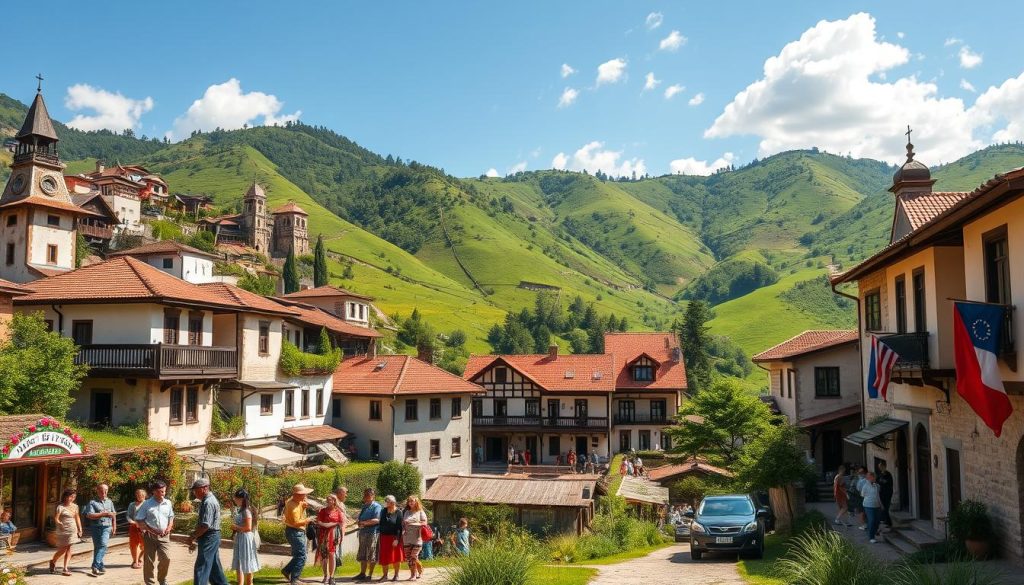
Exploring Georgia (Europe) reveals a rich mix of languages. Georgian is the official language, spoken by about 87.6% of the people. It’s used by nearly four million Georgians.
But Georgia’s language scene goes beyond just Georgian. Let’s explore the multilingual nature of this European country:
- Official Languages:
- Georgian (primary national language)
- Abkhaz (official in Abkhazia Autonomous Region)
- Widely Spoken Languages:
- Russian
- Azerbaijani
- Armenian
- English
Ethnic groups shape Georgia’s language scene. The 2002 census shows:
| Ethnic Group | Percentage |
|---|---|
| Georgians | 83.8% |
| Azerbaijanis | 6.5% |
| Armenians | 5.7% |
| Russians | 1.5% |
| Other | 2.5% |
Younger Georgians are learning English more, while older folks often know some Russian. The language scene in Georgia is changing, showing the country’s complex history and culture.
“Language is the roadmap of a culture. It tells you where its people come from and where they are going.” – Rita Mae Brown
Georgian Language Structure and Characteristics
Explore the Georgian language, a true marvel of linguistic diversity. It has a complex structure and unique traits that make it stand out globally.
The Georgian language has a unique sound system. It has 28 consonants and 5 main vowels. This creates a rich sound palette that makes speaking both complex and beautiful.
Phonological System
The Georgian language’s sound system is truly unique. It allows for up to six consonants at the start of words. This creates special sound combinations.
- Aspirated consonant sounds
- Voiced and ejective stops
- Complex affricates and fricatives
Grammatical Features
The Georgian language’s grammar is a true marvel. It’s agglutinative, meaning it uses suffixes to show grammatical functions. This results in long words that carry entire phrases.
| Grammatical Aspect | Details |
|---|---|
| Word Order | Subject-Object-Verb (flexible) |
| Grammatical Cases | 7 cases including nominative, ergative, accusative |
| Verb Characteristics | Can include subject and object references in single word |
Writing System
The Georgian writing system is visually stunning. It has 33 unique symbols, each for a specific sound. UNESCO has recognized it as Intangible Cultural Heritage. It’s more than a script; it’s a cultural treasure.
The Georgian script: Where every letter tells a story of linguistic heritage and cultural identity.
Learning the Georgian language is more than just communication. It’s about discovering a rich cultural expression and linguistic innovation.
Regional Dialects and Variations
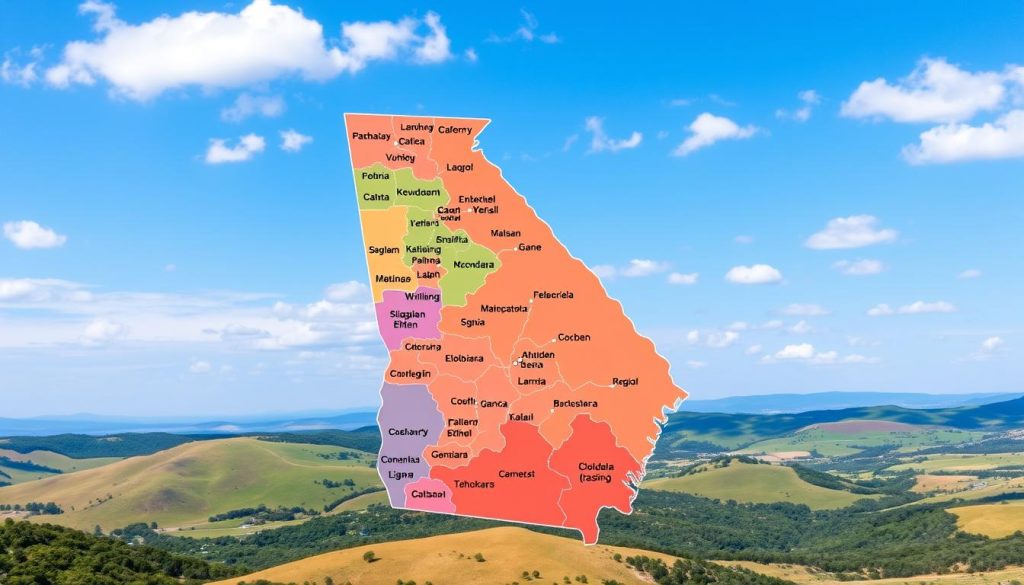
Georgia’s language scene is full of regional dialects. These show the country’s varied geography and culture. The different areas have their own special ways of speaking, making a colorful mix of dialects.
The main language, Georgian, comes from the Kartlian dialect, spoken around Tbilisi. This is the base for official talks and media. But, there’s much more to the language than this standard form.
“Language is the roadmap of a culture. It tells you where its people come from and where they are going.” – Rita Mae Brown
Georgia’s dialects fall into two main groups:
- Western Georgian Dialects
- Eastern Georgian Dialects
Each group has its own sound, words, and grammar. Yet, people from different areas can still understand each other. This shows how united the Georgian language is.
| Dialect Group | Primary Regions | Distinctive Features |
|---|---|---|
| Kartlian | Central Georgia | Base for standard Georgian |
| Kakhetian | Eastern Georgia | Unique vowel pronunciations |
| Imeretian | Western Georgia | Softer consonant sounds |
| Gurian | Southwestern Georgia | Complex verb conjugations |
Learning about these dialects helps us see Georgia’s rich language variety. They are not just ways to talk but also keep local traditions and stories alive.
Minority Languages in Georgia
Georgia is home to many languages beyond its official one. The country has a rich mix of minority languages that show its complex culture. These languages weave together to form Georgia’s diverse identity.
Georgia’s languages include several important minority groups. Let’s look at the main ones:
Russian Language Presence
The Russian language is big in Georgia. Even with past conflicts, Russian is still widely spoken. Many Georgians, especially the older ones, speak Russian because of the Soviet era.
Armenian and Azerbaijani Communities
Armenian and Azerbaijani languages are also big in Georgia. These groups have long histories in the area. They add to Georgia’s cultural and language mix.
- Armenian speakers live mainly in cities
- Azerbaijani speakers are found more in the south
- Both groups keep strong ties to their languages and cultures
Other Ethnic Language Groups
Georgia also has other languages besides the main ones:
| Language | Estimated Speakers | Primary Regions |
|---|---|---|
| Mingrelian | Around 500,000 | Western Georgia |
| Svan | Approximately 30,000 | High Mountain Regions |
| Assyrian | Less than 10,000 | Urban Centers |
These minority languages are more than just ways to talk. They hold cultural memories and identities. Knowing about them helps us see Georgia’s rich language diversity.
The Role of Russian Language in Modern Georgia
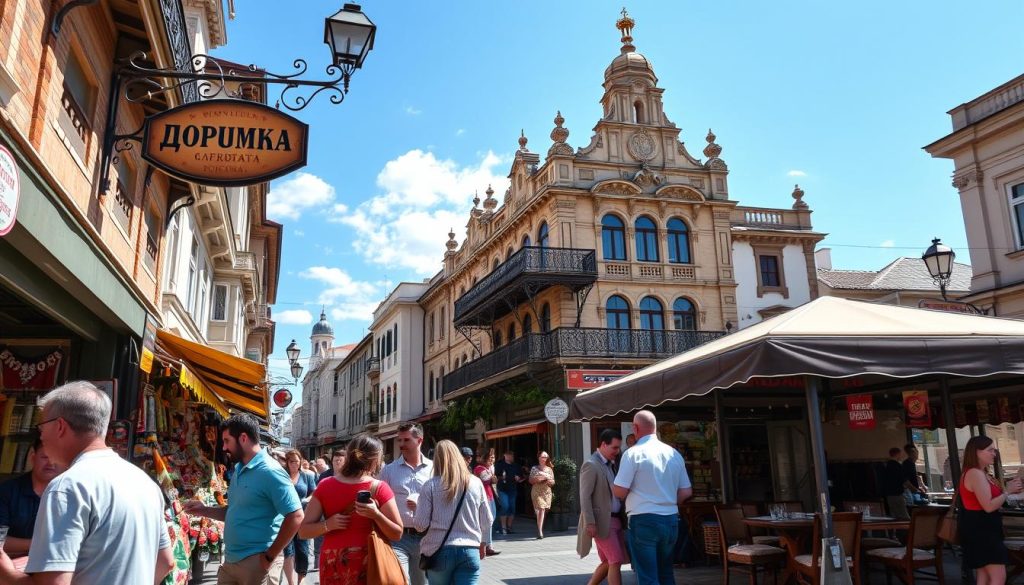
Georgia’s language scene is complex, with Russian playing a big role. Even with political changes, Russian is still important. The Soviet era’s influence still affects how languages are used today.
In Georgia, Russian language use shows interesting patterns. Before 1991, it was everywhere in public life, schools, and daily talks. When Georgia became independent, language policies changed a lot.
“Language is the roadmap of a culture. It tells you where its people come from and where they are going.” – Rita Mae Brown
Here are some key points about Russian in modern Georgia:
- It’s still used in business and city talks.
- Many older people speak Russian.
- It’s not as official as it used to be.
- English is becoming more common in schools.
Even though official rules have cut down Russian’s role, it’s still key for talking. The number of ethnically Russian people dropped from 6.3% in 1989 to 1.5% in 2002. This shows big changes in the population.
Now, Georgia focuses more on English, trying to lessen Russian’s impact. TV rules require Georgian subtitles and discourage Russian ones. These steps show how language and identity mix in today’s Georgia.
Language Policy and Education
Georgia’s language policy is complex, with many official languages and a focus on linguistic diversity. The country has developed educational strategies that balance national identity with multilingualism. This ensures that everyone can develop their language skills fully.
The Georgian government has put in place strong language policies. These policies aim to keep the national language strong while also supporting minority languages. Georgian is the main language used in schools across the country.
Official Language Legislation
Georgia’s laws on language focus on protecting and promoting the Georgian language. Key parts of these laws include:
- Setting Georgian as the main language for teaching
- Protecting the rights of minority language speakers
- Creating bilingual education programs
- Supporting language integration
Educational System and Language Teaching
The way Georgia teaches languages in schools is all about full linguistic development. Schools use strategies that:
- Ensure top-notch Georgian language teaching
- Help minority language speakers
- Build multilingual skills
- Use language to teach culture
“Language is the roadmap of a culture. It tells you where its people come from and where they are going.” – Rita Mae Brown
Georgia’s educational policies are designed to care for its linguistic heritage. At the same time, they embrace the challenges of multilingualism in today’s world.
Georgian Language in International Context
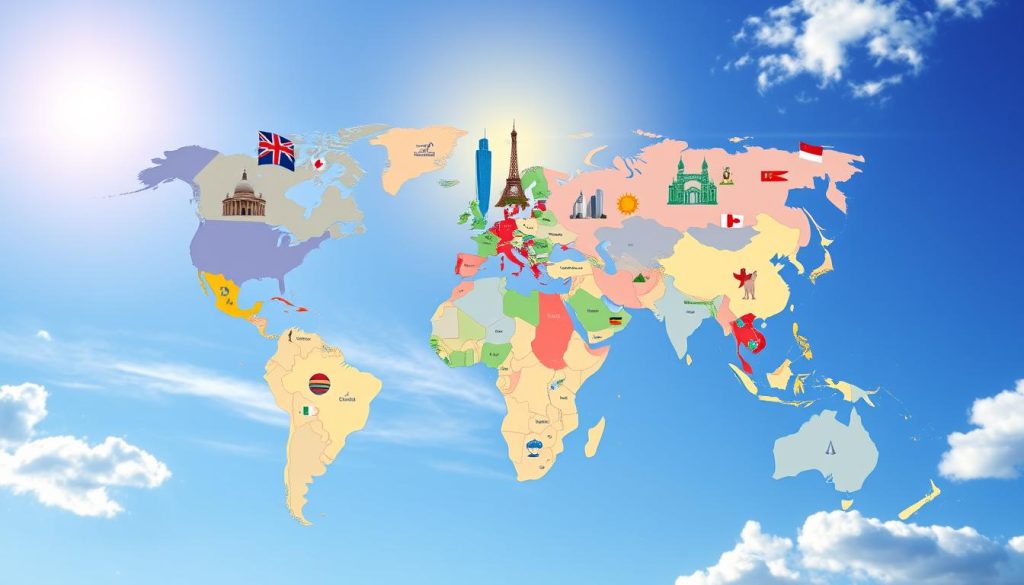
The Georgian language is a unique treasure in the world of communication. It has about 3.76 million native speakers. This language shows amazing diversity, catching the eye of language lovers everywhere.
Exploring the Georgian language, you find many interesting international traits:
- Distinctive writing system with three historical scripts
- Complex grammatical structure unlike Indo-European languages
- Rich phonetic complexity with unique consonant clusters
Looking at the Georgian language’s global presence, researchers find it amazing. The language is a linguistic marvel with its detailed grammatical cases and vigesimal numeric system. It stands out from more common languages.
“Georgian is not just a language, but a cultural bridge connecting centuries of human expression.” – Linguistic Research Institute
International efforts are growing to save and share the Georgian language. Translation projects and cultural exchange programs are introducing it to the world.
| Language Feature | International Significance |
|---|---|
| Writing Systems | Unique Mkhedruli script with historical variants |
| Grammatical Cases | Seven distinct cases compared to three in English |
| Global Speakers | Approximately 3.76 million native speakers |
The push to keep linguistic diversity alive is strong. It’s driven by a desire to preserve the Georgian language globally. Your understanding of this rich heritage helps us all appreciate global culture.
Language Preservation and Modern Challenges
Georgia is facing big challenges to keep its many languages alive. The country has a complex mix of languages, with some at risk of disappearing. It needs urgent action to save these languages.
The digital world brings both good and bad for language preservation. New tech tools help protect languages, but they also threaten old ways of speaking.
Digital Age Language Adaptation
Understanding the fight to save minority languages in Georgia is key. Digital tools are now crucial for documenting and reviving languages:
- Online language learning platforms
- Digital archives of minority language materials
- Mobile applications for language preservation
- Social media documentation of linguistic traditions
Cultural Heritage Protection Strategies
Keeping Georgia’s languages alive needs a strong plan. The country faces big hurdles in protecting its language diversity:
| Language Group | Endangered Status | Estimated Speakers |
|---|---|---|
| Megrelian | Definitely Endangered | 300,000 |
| Svan | Definitely Endangered | Fewer than 30,000 |
| Abkhazian | Severely Endangered | Around 100,000 |
“Language is the roadmap of a culture. It tells you where its people come from and where they are going.” – Rita Mae Brown
Georgia is working hard to save its languages. It’s using education, digital tools, and community programs. With new tech and old traditions, Georgia hopes to keep its languages alive for the next generations.
Conclusion
Exploring Georgia (Europe) reveals a world where language is more than just a way to communicate. The Georgian language, spoken by nearly four million, is a symbol of national identity and cultural strength. Its unique 33-letter alphabet and 18 dialects show its deep historical roots.
Georgia’s language scene is diverse, with Georgian at its core. But the country also values minority languages like Russian, Armenian, and Azerbaijani. This mix shows Georgia’s commitment to preserving its culture while embracing outside influences.
Learning Georgian opens a door to a complex language system. It challenges traditional language structures with its agglutinative nature and unique numeral system. Efforts to protect this language ensure it will be valued by future generations.
The Georgian language’s future is bright, thanks to ongoing research and cultural efforts. As Georgia faces political and social challenges, its language remains a beacon of resilience and creativity. It shows the country’s dedication to its unique cultural identity.
The above is subject to change.
Check back often to TRAVEL.COM for the latest travel tips and deals.
Here are some Tours & Sightseeing suggestions that might pique your interests!
